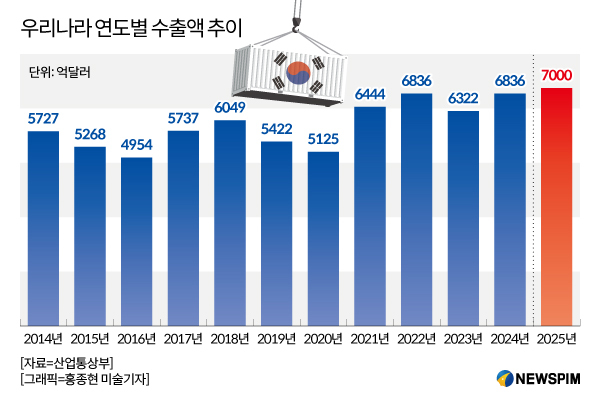농림축산식품부와 해양수산부는 농수산 식품의 수출실적을 연이어 홍보하고 있지만, 정작 농림축수산물의 무역적자가 50조원을 상회하는 것으로 확인되면서 수출실적 자화자찬에 몰두할 때가 아니라는 지적이 제기됐다.

농림축산식품부는 지난해부터 최근까지 △농식품 수출 최초 90.1억 불 역대 최대 실적(23년 12월), △농식품 수출은 금메달(24년 7월), △농식품 수출 12개월 연속 플러스(24년 9월) 등 보도자료를 통해 농식품 역대 최대 수출실적을 전면적으로 홍보해왔다. 해양수산부 역시 작년 수산 식품 수출액이 2022년에 이어 2년 연속 30억 불을 달성하는 성과를 이뤘다고 홍보한 바 있다.
그러나 국회 농림축산식품해양수산위원회 윤준병 의원(더불어민주당, 전북특별자치도 정읍시·고창군)이 농림축산식품부와 해양수산부로부터 제출받은 자료에 따르면, 작년 기준 농·림·축·수산물의 수출액은 120억 1,749만 달러(15조 7,669억원*), 수입액은 501억 9,295만원(65조 8,531억원)으로 집계되었으며, 농림축수산물의 무역적자는 381억 7,546만 달러(50조 862억원)인 것으로 밝혀졌다. * 9월 28일 환율 1달러 1,312원
그러나 농림축수산물 무역적자만 무려 50조원에 달하고 있음에도 불구하고, 농림축산식품부와 해양수산부는 무역적자에 따른 대응책을 마련하기보다는, 수출 실적 홍보에 열을 올리고 있는 것은 ‘눈 가리고 아웅’하는 격이라는 지적이다.
연도별 농림축수산물 무역적자를 보면, △2021년 367억 309만 달러, △2022년 435억 5,893만 달러, △2023년 381억 7,546만 달러로 최근 3년간 매년 350억 달러(45조 9천억원) 이상의 무역적자가 발생했다. 특히, 농림축산식품부의 경우 작년 말 ‘90.1억불 역대 최대 실적’을 홍보했지만, 농림축산물 수입액(438억 1,400만 달러)은 수출액의 4.8배에 달했다.
해양수산부 역시 올 1월 ‘우리 수산식품 수출, 2년 연속 30억 불 달성’이라는 제목으로 수산식품 수출 실적을 자랑했지만, 수입 실적과 비교하면 2022년과 2023년 각각 38억 893만 달러(4조 9,973억원), 33억 8,146만 달러(4조 4,364억원) 적자인 것으로 확인됐다.

국가별 농림축수산물 무역적자 현황은 미국, 중국, 호주, 베트남 순
FTA 체결이 무역적자의 주범...농어업인들의 희생을 통해 제조업 성장
한편, 작년 국가별 농림축수산물 무역적자 현황을 보면 미국이 76억 1,393만 달러(9조 9,894억원)로 가장 많은 적자를 기록했으며, 중국이 46억 4,872만 달러(6조 991억원), 호주가 36억 7,941만 달러(4조 8,273억원), 베트남 16억 9,903억 달러(2조 2,291억원)로 뒤를 이었다. 특히 작년 기준 농림축수산물 무역적자 상위 10개국 모두 자유무역협정(FTA) 체결국으로, FTA 체결이 무역적자의 주범이며, 농어업인들의 희생을 통해 제조업이 성장하고 있음을 확인해 주고 있다.
윤준병 “농림축수산물 무역적자 대응책 마련 및 수입에 따른 피해 농어업인 지원대책 마련 시급!
윤준병 의원은 “매년 약 50조원 가까운 농림축수산물 무역적자가 발생하고 있는 가운데, 주무부처인 농림축산식품부와 해양수산부가 단순히 수출 실적만을 가지고 치적을 홍보하고 있는 현 행태는 손바닥으로 하늘을 가리는 것으로, 농어업인들의 아픔을 위로하는 데에도 결코 바람직하지 않다”며, “농림축산식품부와 해양수산부는 ‘눈 가리고 아웅’식 자화자찬이 아닌, 농어업·농어민을 위한 실질적인 대책과 이에 따른 실적을 내야 한다”고 촉구했다.
이어 윤 의원은 “우리나라는 식량자급률이 낮고, 수입 의존성이 높은 국가인 만큼 높은 농림축수산물 무역적자에 대한 경각심을 가져야 한다”며, “기후 위기와 국제정세 변동에 대비해 농림축수산물의 수출경쟁력을 높이는 것은 물론, 자유무역협정(FTA) 체결을 통해 피해를 입고 있는 농어업인들에 대한 세심한 지원 대책을 마련하는 데 적극 나서야 한다”고 역설했다. hpf21@naver.com
* 아래는 위 기사를 '구글 번역'으로 번역한 영문 기사의 [전문]입니다. '구글번역'은 이해도 높이기를 위해 노력하고 있습니다. 영문 번역에 오류가 있을 수 있음을 전제로 합니다.
*The following is [the full text] of the English article translated by 'Google Translate'. 'Google Translate' is working hard to improve understanding. It is assumed that there may be errors in the English translation.
Rep. Yoon Jun-byeong: “Trade deficit in agricultural, forestry, livestock, and fishery products is 50 trillion won... Ministry of Agriculture, Food and Rural Affairs and Ministry of Oceans and Fisheries are praising their export performance!”
FTA signing - The main culprit of the trade deficit, the sacrifice of farmers and fishermen, is driving growth in the manufacturing industry... Support measures must be prepared
The Ministry of Agriculture, Food and Rural Affairs and the Ministry of Oceans and Fisheries have been continuously publicizing the export performance of agricultural, forestry, and fishery products, but as it has been confirmed that the trade deficit in agricultural, forestry, livestock, and fishery products exceeds 50 trillion won, criticism has been raised that it is not the time to be praising their export performance.
From last year to recently, the Ministry of Agriculture, Food and Rural Affairs has been comprehensively publicizing the highest ever agricultural and food export performance through press releases such as △the first ever agricultural and food export of 9.01 billion dollars (December 2023), △agricultural and food exports won a gold medal (July 2024), and △agricultural and food exports were positive for 12 consecutive months (September 2024). The Ministry of Oceans and Fisheries also announced that last year's fishery product exports achieved $3 billion for the second consecutive year, following 2022.
However, according to the data submitted by Rep. Yoon Jun-byeong (Democratic Party of Korea, Jeonbuk Special Self-Governing Province, Jeongeup City and Gochang County) of the National Assembly's Agriculture, Forestry, Livestock, Food, and Oceans and Fisheries Committee from the Ministry of Agriculture, Food and Rural Affairs and the Ministry of Oceans and Fisheries, the exports of agricultural, forestry, livestock, and fishery products last year were $12,017.49 million (KRW 15,766.9 billion*), the imports were KRW 50,192.95 million (KRW 65,853.1 billion), and the trade deficit in agricultural, forestry, livestock, and fishery products was $38,175.46 million (KRW 50,862 billion). * Exchange rate of 1 dollar to 1,312 won on September 28
However, despite the fact that the trade deficit in agriculture, forestry, livestock, and fisheries alone amounts to a whopping 50 trillion won, the Ministry of Agriculture, Food and Rural Affairs and the Ministry of Oceans and Fisheries are focusing on promoting export performance rather than preparing countermeasures for the trade deficit, which is like ‘playing blindly.’
Looking at the trade deficit in agriculture, forestry, livestock, and fisheries by year, it is △36.7309 billion dollars in 2021, △43.55893 billion dollars in 2022, and △38.17546 billion dollars in 2023, resulting in a trade deficit of more than 35 billion dollars (45.9 trillion won) every year for the past three years. In particular, the Ministry of Agriculture, Food and Rural Affairs advertised its ‘highest ever performance of $9.01 billion’ at the end of last year, but the import amount of agricultural, forestry and livestock products ($43.814 billion) was 4.8 times the export amount.
The Ministry of Oceans and Fisheries also boasted its export performance of fishery products in January this year under the title ‘Our fishery product exports achieve $3 billion for two consecutive years’, but compared to the import performance, it was confirmed that there was a deficit of $3.8893 billion (KRW 4.9973 trillion) and $3.38146 billion (KRW 4.4364 trillion) in 2022 and 2023, respectively.
The status of trade deficits in agriculture, forestry, livestock, and fisheries products by country is in the order of the US, China, Australia, and Vietnam.
FTAs are the main culprit of the trade deficit... Manufacturing is growing at the expense of farmers and fishermen.
Meanwhile, looking at the status of trade deficits in agriculture, forestry, livestock, and fisheries products by country last year, the US recorded the largest deficit at $7.61393 billion (KRW 9.9894 trillion), followed by China at $4.64872 billion (KRW 6.991 trillion), Australia at $3.67941 billion (KRW 4.8273 trillion), and Vietnam at $1.69903 billion (KRW 2.2291 trillion). In particular, all of the top 10 countries with trade deficits in agriculture, forestry, livestock, and fisheries products as of last year are countries that have signed free trade agreements (FTAs), confirming that FTAs are the main culprit of the trade deficit and that manufacturing is growing at the expense of farmers and fishermen.
Yoon Jun-byung: “It is urgent to prepare countermeasures to the trade deficit in agricultural, forestry, livestock, and fishery products and to prepare measures to support farmers and fishermen who suffered damage due to imports!
Rep. Yoon Jun-byung said, “While the trade deficit in agricultural, forestry, livestock, and fishery products is occurring every year at around 50 trillion won, the current behavior of the competent ministries, the Ministry of Agriculture, Food and Rural Affairs and the Ministry of Oceans and Fisheries, simply publicizing their achievements based on export performance is like covering the sky with one’s hand, and it is by no means desirable in comforting the pain of farmers and fishermen.” He urged, “The Ministry of Agriculture, Food and Rural Affairs and the Ministry of Oceans and Fisheries should not be ‘covering the sky and praising’ themselves, but should come up with practical measures for agriculture and fishery and farmers and fishermen and the results accordingly.”
Rep. Yoon continued, “As our country has a low food self-sufficiency rate and is highly dependent on imports, we must be alert to the high trade deficit in agricultural, forestry, livestock, and fishery products,” and emphasized, “In order to prepare for the climate crisis and changes in the international situation, we must not only increase the export competitiveness of agricultural, forestry, livestock, and fishery products, but also actively work to devise detailed support measures for farmers and fishermen who are suffering damages through the conclusion of free trade agreements (FTAs).” hpf21@naver.com

![[사진] 한국 수출 사상 첫 700,000,000,000달러](https://pds.joongang.co.kr/news/component/htmlphoto_mmdata/202512/30/766d63d6-e69d-4d30-96f9-6d96541a2fb5.jpg)


![[정책의속살] '10살' 됐지만 자라지 않는 한중FTA…정부의 2가지 고민](https://img.newspim.com/news/2025/12/29/2512291642459140.jpg)
